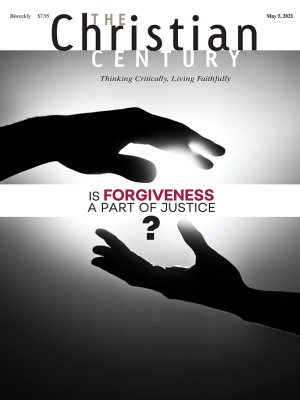May 23, Pentecost B (Acts 2:1–21)
Maybe we should see Pentecost as a celebration of land and labor in which the Holy Spirt is made known.
On the page and in our theology, Pentecost is charged with surpassing drama and significance. While the moment in the manger is delicately hushed and the morning of the empty tomb is marked with confusion and disbelief, Pentecost comes in with a bang. With a rushing noise and a mighty wind, tongues as of flame, an outpouring of the languages of the whole Roman world spoken by unlearned Galilean laborers mistaken for colorful inebriates, and a devastating impromptu sermon by their head fisherman, the age of the Spirit is off and running.
It is the vivid self-disclosure of the eternally proceeding third person of the Trinity who graces the faithful with sevenfold gifts, not even counting the matter of the foreign tongues and the interpretation of Joel’s prophecy. It is the “birthday of the church” in some tellings, or at least the public and miraculous proof of the church’s universal mission witnessed in the very languages of all those nations. It marks the beginning of that progress to the ends of the earth promised and commanded by the risen Christ as the church, like a hermit crab, takes on the shell of an ancient harvest festival for its own exalted mission.
Read our latest issue or browse back issues.
And yet, 2,000 years on, the festival commemorating the event can feel very different. I have usually celebrated this day by asking around for church members who can read the Acts passage in German, Mandarin, or Spanish to create a proper cacophony, in places where I barely knew our next-door neighbors, let alone communities on the other side of town. I am accustomed to thinking of 120 people together in one place as a modest goal to reach or a constituency to hold onto rather than the bursting seeds of a new creation.
Moreover, that powerful image of the disciples speaking in the languages of those gathered from near and far has come down to us through a contradictory history. Those of us in European-descended and colonial churches have been faced with our history not only of coercive evangelism but of identifying conversion to Christianity with the surrender of local culture. Much is made, in theology and preaching, of the freedom of gentiles to become Christians without also “becoming Jews,” but European Christians often failed to apply this logic to the targets of our own missionary efforts.
And that replacement of the Jewish harvest festival with a day to explicate a spiritualized missiology or trinitarian ontology seems to elide the real, ongoing importance of land and harvests in our world—even if we do manage to describe it without anti-Jewish undertones.
This disproportion between the event on the page and in our commemorations may help explain why some people in mainstream Catholic and Protestant churches are fascinated by, and even envious of, Pentecostal and charismatic movements. Where, after all, are ordinary people of all languages and classes being brought together? Where are sons and daughters prophesying as the prophet foretold and Peter insisted had come about? Where is Pentecost not a commemoration on a calendar, with its red vestments and appointed readings, but an ongoing event?
This is not to say that the liturgy and theology of Pentecost ought to be tossed out, nor that everyone should pack up and become Pentecostal. But this story in Acts rewards, and maybe demands, an attempt to hear it again without the weight of history and interpretation we have required it to bear.
It was hardly obvious, even with the benefit of Luke’s hindsight, that the event described in Jerusalem would become its own moment of commemoration—or that a fully distinct Christian church would result from it. One imagines Peter, Mary, and the rest of the 120 being quite at home in their festival, which by this point may or may not have combined the celebration of the early harvest with the commemoration of the covenant at Sinai. Even the jibe from the crowd that the disciples are drunk is more an explanation than an accusation. There’s nothing unusual or untoward about imbibing at a harvest festival. The celebration of human effort brought to fruition, on land that has passed into and out of the hands of small farmers in whom God took a special interest, needs no spiritual gloss to be beautiful and worth treasuring.
Second Temple Judaism, in this story, is clearly a diverse and international religion before any Galilean disciple sets out to share the gospel. The crowds gathered in Jerusalem are not waiting to be given personal significance or religious meaning. And Peter does not seek to take anything away from them or to give them anything alien to their own identity. He’s just telling them that a hope already proclaimed—God’s Spirit poured out on all flesh—has become real among them.
Perhaps Pentecost should always have been a celebration of land and labor into which the Holy Spirit made itself known. “It was the farmer’s real joy that became a metaphor for the gift of religious joy” we identify with Pentecost today, writes Helen Graham, in the context of poor Filipinos’ battle for land. The Spirit imposes no obligation to neglect the relief, joy, and struggle that connects that Jerusalem crowd with our own laboring majority. The Spirit requires no loss to the real diversity of cultures and languages in and around our churches for the sake of celebrating an ideal of universal mission. The little flock of the disciples on whom the Spirit rested did not set themselves apart from the masses. They were a new movement but, like adults in the middle of life’s responsibilities, they forgot their own birthday.






